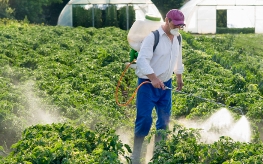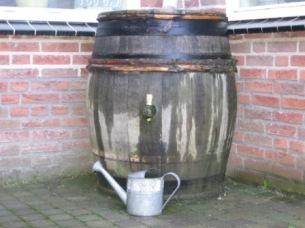Drinking Rain Water
Health Advantages & Disadvantages
by Nancy Hearn, CNC
Note: As an Amazon Associate I earn from qualifying purchases.
Millions of people around the world are drinking rain water. It is a relatively safe and inexpensive source of drinking water.
I am a big fan of harvesting rain water for household purposes, such as showering, bathing, laundering, watering lawns and gardens, and so forth.
There is no question that harvesting rain water is an effective way to conserve water and save money. But it is healthy to drink?
“Since ancient times, the only sources of natural water that are recognized as safe to drink are rain water and water from deep wells,” writes Richard E. Barrans, Jr., Ph.D., Assistant Director of the PG Research Foundation.
“The trick is that the rain water must be carefully handled so that it does not become contaminated.”
Advantages of Drinking Rain Water
The purpose of this article is to consider some of the potential health advantages and disadvantages of drinking rain water on a regular basis.
In addition, rain water does NOT contain the levels of chemicals (such as chlorine and fluoride) that are used in municipal water treatment facilities.
Numerous health conditions are related to the ingestion of both chlorine and fluoride. See references below for further reading on the detriments of drinking chlorinated and fluoridated water.
Another obvious advantage of drinking rain water is that it is inexpensive.
However, availability is also dependent on the climate for harvesting. It should also be collected and handled only under sterile conditions.
One of the most important factors regarding the quality of rain water has to do with the environment in which it is collected. Rain water harvested in a pristine environment, such as high in the mountainous, unpopulated regions of the world, is going to be of much cleaner than rain water collected in a polluted big city.
A Few Disadvantages
According to David Cook of the Argonne National Laboratory, "Rainwater contains pollutants, soil, plant parts, insect parts, bacteria, algae, and sometimes radioactive materials that the rain or snow has washed out of the air."
"Air-borne pollutants from hundreds of miles away can spread quite rapidly. Because of this fact, it would most likely be necessary to test the water on a daily basis to ensure safe drinking."

Cook says that if "harvested rain water is filtered with one of the water filtering systems that can be purchased today, and then the water is boiled, we could probably drink the water safely."
However, he says, “It is safer to get your water from municipal water supplies or from wells that are frequently tested.”
In addition to the problem of contamination, rain water is slightly acidic compared to water out of the ground or from rivers.
Ground water comes into contact with natural occurring minerals, many of which are necessary for optimal health. Mineral rich water is slightly alkaline in pH, which is much more supportive of health in the human body.
Rain water is similar in pH to demineralized waters like distilled and reverse osmosis.
Thus, drinking rain water that has been properly harvested and adequately filtered is an acceptable form of drinking water (in many cases better than tap water or bottled water). However, I do not believe it is as health promoting and as hydrating as mineral rich water and ionized alkaline water.
If you do drink rain water for more than a few weeks, I recommend replenishing trace minerals in the body by adding an unrefined natural sea salt, such as Celtic sea salt, to your water or food.
Reference
Newton.dep.anl.gov: Drinking Rainwater
Further reading . . .
Rainwater Filtration - Reviews and Recommendations for Best Filters
Return from Drinking Rain Water to Best Drinking Water
If you would like to reproduce or republish this article or any other article on this site, feel free to do so but please include a reference or link to the article at WaterBenefitsHealth.com.
Sign Up for Our Monthly
Newsletter
Visitor Comments
"This was the best and most straight forward info on the net yet. I asked a question and got an answer that made sense. Thank you so much!" - Linderlinder
FINALLY!!! I have been wondering about this for years with no 'solid' answer. This is exactly what I've been wanting to know! Thank you for this share..." by Andy
"Thank you for the information, Nancy. I appreciate it. Your article and findings are very helpful, referring to dehydration." - Carolyn
"Lemon water is one drink both my wife and I can't drink. It upsets our stomachs. We are in our sixties and in very good health—well, better health now that we drink about 2 liters plus of water each day. It has made so much difference to our digestive systems and recovery every day. Thank you for your website and effort." - Rod



